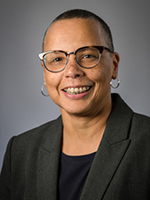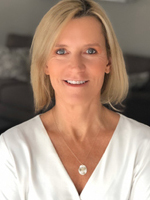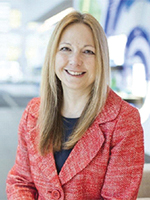7 Notable Women in Supply Chain & Logistics
Meet the women who are succeeding at high levels in their companies, driven by a passion for supply chain and logistics, self-confidence, authenticity, and the ability to untangle the spaghetti of information that drives business decisions.
While men still dominate supply chain and logistics, women continue to make inroads and succeed at substantive roles. One key to progress is that companies are setting hiring goals. “When people know an activity is being observed, it influences behavior,” says Dana Stiffler, vice president with Gartner Research.
Rather than establishing hiring quotas—a concept that can carry negative baggage—organizations can set a goal of assembling diverse interview panels, for example. This helps organizations present an attractive face to job candidates and gain a more nuanced range of feedback about candidates’ performance and potential.
The hard work and dedication of many women in the field, as well as their willingness to seize opportunities and take chances, are driving progress. The women featured here describe the keys to their success and offer insight that can help others navigate their careers.
Tonya Jackson
Senior Vice President, Chief Supply Chain Officer, Lexmark International
How can women prove themselves in a male-dominated field?
Supply chain results are tangible and measurable. Either you shipped or made your inventory levels, or you didn’t. There’s accountability. It’s hard to argue when you deliver results.
Your mom is one of your role models. What lessons did she pass on that help in your supply chain career?
She taught me to meet people where they are. That helps me as a manager because you never know what people may be going through, or what they know or don’t know. I try to start every conversation by reaching out to people where they are and going from there.
How would you describe your leadership style?
I try to balance collaboration with having to say, ‘This is the way it has to be.’ Every now and again, I have to take a stand and be confident in that stance, even if some view it as confrontational.
How can other women become more confident taking a stand?
Go back to the problem and take the person out of it. That’s easier said than done, but if you can stick to solving a problem, it’s not confrontational. And if the facts are on your side, generally you’re not the confrontational one. You’re just in a tense situation because you’re trying to solve a problem.
Lauren Mayher
Americas Logistics Operations Manager, Allyn International
Describe a professional challenge and how you handled it.
I supported a client who asked that we onboard all its locations across the globe into our systems. We hired eight people and worked with IT, human resources, and other areas to implement the project—all in about six months.
The biggest challenge was managing the locations that weren’t used to our systems and strategies. They were used to, for instance, calling ‘mom-and-pop trucking’ to move their shipments.
To win them over, I had to fully understand their concerns and offer creative solutions. In fact, we learned we could enhance some features in our system to optimize their processes and make the experience a positive one.
How does your perspective as a young woman work for you in an area that tends to be male dominated?
I find it important to be transparent and authentic about what I do and don’t know. Most companies these days don’t want ‘yes men.’ They want people who are honest about their capabilities and will follow through on their commitments.
Meri Stevens
Worldwide Vice President, Deliver Organization, Johnson & Johnson
What strengths can women generally bring to the supply chain field?
Dealing with the current healthcare ecosystem is complex; it’s changing rapidly. Many women are good at managing complexity because we have learned to juggle work, children, family, parents, homes, and so on. We’re able to be agile and prioritize, untangling the spaghetti of information to drive needed choices.
What advice would you give women in the supply chain field?
Be bold to bring forth big ideas, but before you go into the decision meeting, make sure you seek out appropriate sponsors for your platform. Then, when you present the idea, people will support you.
It takes work and self-confidence to build these coalitions, but it will pay off. When I started, as a woman, it was tougher to find sponsorship. I had to outwork everyone both at work and at home to be successful. As a result, I was tired most of the time and not always at my best. But it was the only way at that time.
Now, doors are more open, and there are more women role models and those offering to sponsor and support. Working harder is not the most effective strategy.
Lastly, building critical skills such as analytics and data science will make a difference. Supply chain is a data-driven environment and it will only be more data driven as time goes on.
Marielle Cage
Global Lead, Supply Chain Design, TCO and Analytics, Eaton Corporation
How has working in a traditionally male-dominated field affected your career?
I’ve never considered myself a ‘woman in supply chain,’ but rather a supply chain professional. I started my supply chain career in my mid-20s with a lot of young male colleagues who were in similar procurement roles.
Many of the women, including myself, went on to have children a few years later, and had to slow down a bit at that point in our careers. There may have been a gap in career progression between us and our male colleagues for a few years, but we all caught up eventually in the long run.
What steps have been key to your professional success?
Throughout my education, I had several great internships abroad that convinced me my career would be international. Supply chain was the perfect entry point. I was born in France and have experience in multiple industries and business segments, such as computers, manufacturing, energy, and electronics, both in Europe and North America.
I am also multilingual—I speak English, French, Spanish, and Italian. Being able to speak a second or third language transcends spoken dialogue and enables you to relate to different cultural groups more personally.
Annette Danek-Akey
Executive Vice President, Supply Chain, Penguin Random House
Describe the benefits and disadvantages of being a woman in supply chain.
In the past, I struggled—for instance, figuring out how to take a long break in the bathroom because there were no lactation rooms. And I almost didn’t get to work on the second shift in the warehouse because some men in upper management thought it wouldn’t be safe for me to work those hours. But other men stuck up for me.
I was told I needed to be tougher and to be more ‘in charge.’ I wasn’t recognized for my teamwork and collaboration skills.
In the process, I learned different points of view and studied different types of leaders. Being a woman in a field with a lot of men forced me to learn to find common ground and be curious about others. Those are great skills for a leader in today’s environment.
What advice would you give a woman starting out in supply chain?
Be open to opportunities and possibilities. If you need to, create your own opportunities. Someone could say no, but you never know. Find a professional organization you like. Your professional life will have ups and downs, and being involved can help cushion the low points and allow you to share the joys.
Maria Nieradka
Head of Business Operations, Repligen
How can the approaches taken by women and men in the workplace differ?
Over the years I have noticed when I interview candidates for a job and they have 85% of the skills required, men candidates start with the 85% and project confidence, building on their accomplishments. Women start with the 15% they don’t have. In coaching women, I work to give them confidence to communicate their achievements effectively.
What steps in your career would you do differently?
I would have been braver sooner and been more assertive in getting assignments. I was lucky to have great people around me who believed in me more than I believed in myself.
What advice would you offer other women in supply chain?
Because so many men are decision-makers, especially in operations, it’s important to have both male and female advocates. Also, get profit and loss experience. Anything you can do to get a role with financial accountability opens more career options.
Anne Herman
Vice President, Global Operational Excellence, and Chief Customer Officer, MSA Safety
What’s one professional challenge you’ve tackled and what steps were key in your success?
I took a role in product approvals, an area that was struggling, and in which I wasn’t a subject matter expert. But I was able to take a transferable skill—problem solving—and apply it. I learned I am good at fixer-uppers.
When stepping into a new area, you need to articulate your transferable skill sets, such as change management or data analytics, and look for positions that need them.
You also need confidence. Women tend to not raise their hands unless they can check off every box on a job description. Confidence comes from taking chances and learning you can do new things.
How have you handled criticism about being too nice?
Many people are used to the traditional management style: ‘Here’s what you have to do; now go do it.’
I think it’s a balance, but there’s strength in being collaborative. For instance, I took on a larger role in optimizing our plant footprint and spent several years closing plants, moving the corporate headquarters, and effecting cultural change as we moved to a more open work environment. The changes impacted about 500 employees and we lost only five.
By communicating—we held about 120 communication sessions—and listening, I could help build consensus.







